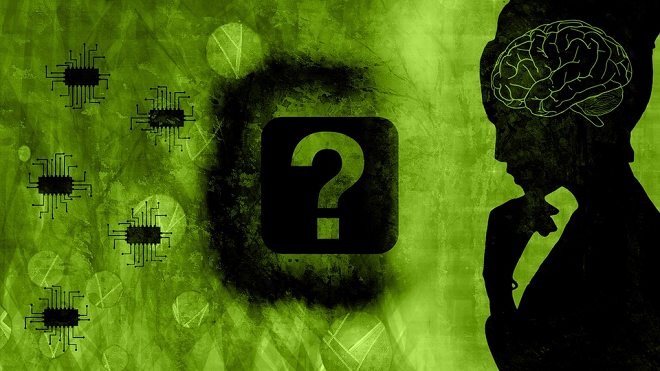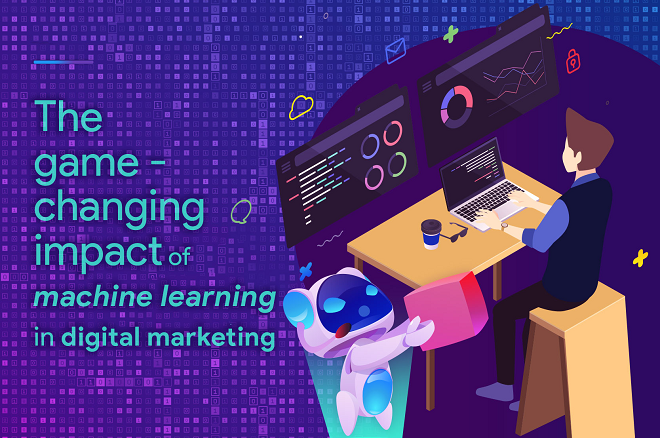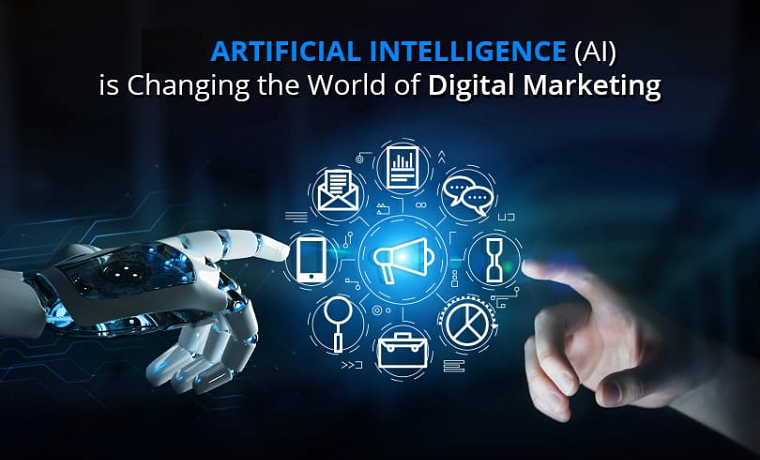Machine learning has earned its reputation as an incredibly powerful trend in the hands of digital marketers, and for good reason. With so much emphasis on Big Data and analytics in digital marketing, machine learning excels at crunching this data at speeds humans are not capable of, and with virtually no errors.
At this point, there’s no going back, and while many people are simultaneously fearful and excited for the possibilities of automated labor and big AI, it certainly has permanently transformed the digital marketing industry once and for all.
In this article, we’ll explore the various ways machine learning is proving beneficial to digital marketing teams, and overall being one of the biggest technology disruptors of the century.

Why Data Science is so Valuable For Digital Marketing
Consumer data is extremely valuable to digital marketing companies, that’s why practically every website we sign up for, every app we install on our phones, collects our data one way or another. There’s big money in selling consumer data, but there’s even bigger money in knowing how to properly use it.
Consumer data is an umbrella for all sorts of things – from consumer behavior patterns to predictive analytics, to attitudinal data that can reflect consumers’ preferences and satisfaction. It’d take a while to fully explain how AI is fed data and how machine learning algorithms are trained, so you might be interested in online machine learning courses.
In order to actually use all of this data effectively, digital marketing companies need to be able to 1) look at it objectively, which is fairly impossible when staring at huge spreadsheets and charts, and 2) relay this information to marketing departments and how best to capitalize on the information presented.
Machine learning and AI are able to go through all of the available data and highlight specific trends or other useful statistics, based on the human teams’ criteria for what is useful information. It can act as a filter, in other words, for the information that humans would spend an inordinate amount of time silting through.
Examples of How ML has Transformed Digital Marketing

There’s absolutely no denying that AI and ML have transformed digital marketing, but you’ll need some concrete examples to understand exactly how. It’s not enough to say “AI go brrr, human brains so slow” because that devalues the human minds guiding machine learning. It isn’t autonomous to the least degree, we might get there but humans still play a large role in directing machine learning to what it should actually be learning.
With that said, here are several ways that machine learning has certifiably transformed digital marketing:
- Businesses have a more comprehensive overview of their existing customers and behavioral trends of consumers that can help targeting leads.
- AI takes a chunk of the guesswork out of the game, helping digital marketing companies to formulate effective strategies with fact-based statistics.
- AI algorithms have increased productivity rather than replace human labor, as the automation of repetitive tasks and data-crunching enables human teams to focus more on the important stuff.
- Businesses have been able to create content that performs much better thanks to the cognitive reasoning abilities of AI systems, which excel at reasoning and problem-solving. That is mainly what AI does – you give it a problem, it crunches all the various solutions until it finds the best one.
AI and Machine Learning in Advertising Campaigns
So to leave all the technical jargon aside, what most people are really interested in is exactly how machine learning and AI effectively contribute to digital marketing. It literally surrounds you every day on the internet, but you might not be aware exactly how.
PPC (pay-per-click) marketing is one of the largest digital marketing avenues. Typically these ad campaigns are set up with certain algorithms to only be displayed to internet users that fit certain identity criteria. These criteria can be geolocation, hobbies, and interests, pretty much anything you’d put into your “About Me” section on your personal Facebook.
So you likely already know that if you search on Amazon for computer accessories, Facebook will show you nonstop ads for computer accessories. That’s a small part of how it works though because that’s more cookie-based than AI-driven.
What machine learning and AI do is help the systems detect who actually fits the criteria given for ad campaigns, and help develop more effective criteria. For example, you might have a hunch that people who buy expensive PC gaming hardware will likely (not always) be males between ages 18 – 35, and they probably tend to actually finalize a purchase on payday.
With big data analytics, you can turn that hunch into an actionable set of data statistics, so you know exactly who the core audience for a given product or industry will be (and tempt them with sales around payday).
So no longer do PPC campaign managers need to spend days or even weeks researching consumer trends and popular keywords, but all of that information is neatly condensed and presented by AI platforms in a much more easily digestible way. This, in turn, greatly increases the ROI of companies who utilize such AI platforms.

